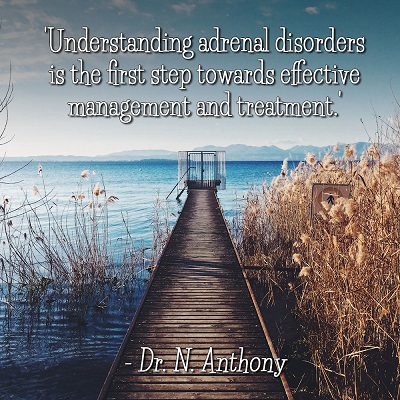 Adrenal gland disorders are conditions that affect the normal functioning of your adrenal glands. When these glands start experiencing problems, it can lead to a range of health issues.
Adrenal gland disorders are conditions that affect the normal functioning of your adrenal glands. When these glands start experiencing problems, it can lead to a range of health issues.
From producing too much or too little of certain hormones to causing disruptions in your body’s stress response, adrenal gland disorders can have a significant impact on your overall well-being.
To avoid adrenal problems and all the associated health conditions that may arise from it, you need to learn how you can best manage your stress levels. However, many people find it difficult to relax and don’t even realize that their adrenals are being affected while they are stressed and feeling out of control.
Hopefully, that’s not you! So now let’s take a look at two adrenal gland disorders – Addison’s disease and Cushing’s syndrome.
Addison’s disease and Cushing’s syndrome are two distinct medical conditions that involve imbalances in the levels of cortisol, a hormone produced by the adrenal glands. However, they are opposite in terms of cortisol levels and their underlying causes.
Here are the key differences between the two:
Addison’s Disease
In Addison’s disease, the adrenal glands do not produce enough cortisol (and sometimes aldosterone). This leads to low cortisol levels in the body.
The adrenal glands in the endocrine system, responsible for producing hormones that affect several tissues and organs in the body, have now become depleted. Without enough cortisol and aldosterone in your system, the body may experience the following symptoms.
- Extreme fatigue and muscle weakness.
- Darkened skin in some areas of the body.
- Lower back pain, leg pain, or abdominal pain.
- Muscle and joint pain.
- Vomiting or diarrhea.
- Emotional health issues, such as depression or irritability.
- Low blood pressure.
- Weight loss and lack of appetite.
- Salt cravings.
Addison’s disease can affect anyone and mainly alters the body’s natural ability to produce hormones, which can become life-threatening if left unattended. Hormone secretion affects several important organs in the body, and a deficiency can quickly escalate to severe health problems.
Cushing’s Syndrome
In Cushing’s syndrome, there is an excess of cortisol in the body, often caused by the adrenal glands producing too much cortisol or due to external factors such as the overuse of corticosteroid medications. Excessive amounts of cortisol in the body may cause the following symptoms.
- Weight gain.
- Skin problems, such as acne, infections, and cuts are slow to heal.
- Fatty tissue deposits within the upper back and midsection of the body.
- Fragile skin that gets easily bruised
- Insect bites and infections that do not easily go away.
- Pink or purple stretch marks on the skin.
- Irregular menstruation (for women).
- Thicker body and facial hair (for women).
- Low sex drive (for men).
- Erectile dysfunction (for men).
- Skin darkening.
- Mental health problems such as anxiety and depression.
- Irritability.
- Severe fatigue and muscle weakness.
- Loss of self-control.
- Headaches.
Having too much cortisol in your system may result from having an extremely stressful lifestyle that extends for long periods of time, or due to taking oral corticosteroid medications. In some cases, the body may simply produce more cortisol than it needs.
While the body needs some amounts of cortisol to deal with regular stress and other bodily functions such as regulating blood pressure, reducing inflammation, and keeping cardiovascular health in shape, cortisol also plays a role in converting macronutrients from food into energy.
Too much cortisol can lead to Cushing’s syndrome and other related health problems.
Final Thoughts
Addison’s disease is characterized by low cortisol levels due to adrenal gland dysfunction, while Cushing’s syndrome involves high cortisol levels often caused by various factors including adrenal tumors or excessive corticosteroid use. Both conditions require medical diagnosis and management to ensure proper hormonal balance and overall health.
Self-diagnosis and self-treatment are not advisable due to the complexities involved in hormone regulation and management. Without medical intervention, symptoms may become worse and escalate quickly to become life-threatening. Please seek your healthcare provider’s advice to address problems caused by the adrenal glands before symptoms worsen.






